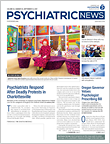The American Journal of Psychiatry published a paper in May 1980 titled “Patient Access to Records: Tonic or Toxin,” which discussed the controversial topic of sharing psychiatry clinical notes with patients. An international movement known as OpenNotes has gained considerable momentum in the last several years and reignited interest within psychiatry.
OpenNotes allows patients to independently read their clinicians’ visit notes. Research on the impact of OpenNotes in primary care settings suggests improved communication between patients and clinicians, greater patient engagement and adherence with care plans, and improvement in the quality of care.
Although we know that psychiatric patients are also primary care patients, the impact of sharing notes around psychiatric care had not been looked at specifically in a psychiatric outpatient setting. A study of which we are coauthors published in the September ScienceDirect offers pilot evidence as well as clinician and patients’ perspectives on implementing OpenNotes in a busy outpatient psychiatry clinic.
In the study, 15 mental health clinicians, including psychiatrists, a nurse practitioner, and social workers, offered 568 of their patients immediate access to clinical notes through the hospital online patient portal over a 20-month period. Thirty percent, or 117, of the study patients read their notes, and 52 patients completed an exit survey about their experience with OpenNotes. Survey results indicated patients found that access to their visit notes helped them better remember care plans, adhere to medication regimens, and make the most of clinical appointments.
Clinicians reported that OpenNotes did not significantly increase their workload or lead to complications in the treatment relationship. However, almost all of the clinicians believed this was a function of patient selection for the study, which excluded many with psychotic illnesses and severe personality disorders.
While it is a mistake to overinterpret the results of this pilot study, the results do suggest that offering select patients easy access to psychiatry notes is not “toxic” and in fact may improve treatment in an outpatient setting in an academic medical center. It is hoped that the results will spur more interest and research in OpenNotes for psychiatry. ■
More information about OpenNotes can be accessed
here. “Patient Access to Records: Tonic or Toxin?” is available
here. “Patient Access to Electronic Psychiatric Records: A Pilot Study” is located
here.

